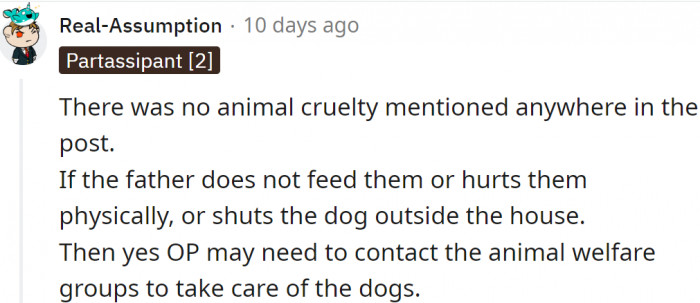Redditor Doesn't Want To Help Dad Raise Puppies He Brought Home Because Of What Happened To Previous Family Dogs
It is important for the family to discuss the idea of getting a dog and come to an agreement that everyone is comfortable with. All family members should be involved in the decision-making process and agree on the responsibilities of owning a pet.
It is also a good idea to consider whether the family has the resources to care for a pet and to ensure that everyone is on board with the idea before committing to it. We have one of those stories today.
OP and their dad live together. OP has repeatedly told their dad that they do not want a puppy due to what happened with the last three dogs their dad had taken in.
Despite this, their dad showed up one day with two puppies, claiming one was for him and one was for OP. Now, the puppies often urinate in their dad's bed, and their dad passes out on his recliner with them.
OP picks up the mess the puppies make but refuses to spend time with them. OP wonders if they are the asshole for not wanting to spend time with the puppies while their dad takes care of the two dogs until he is exhausted.
Read the full story below:
OP asks:

OP and their dad live together. OP has repeatedly told their dad that they do not want a puppy due to what happened with the last three dogs their dad had taken in.

Despite this, their dad showed up one day with two puppies, claiming one was for him and one was for OP.

Understanding Attachment Styles
The reluctance to help a parent raise puppies may stem from underlying attachment issues.
Dr. Mary Ainsworth's research on attachment styles reveals how early experiences with caregivers can shape our responses to relationships later in life.
Individuals with anxious or avoidant attachment styles may feel hesitant to engage with situations that remind them of past traumas.
Understanding Attachment and Responsibility
The reluctance to help with raising puppies often stems from deep-seated attachment issues and past experiences.
According to attachment theory, individuals who have faced loss or abandonment may develop avoidance patterns in relationships, leading them to hesitate in caring for new animals.
This behavior reflects a protective mechanism, safeguarding individuals from potential emotional pain associated with loss.
OP has offered the following explanation for why they think they might be the asshole:

It's Dad's problem to walk and clean up after them.

They are still living beings. There's a moral obligation.

In this case, the individual’s prior experiences with family dogs could be triggering these attachment-related fears.
Research in the Journal of Family Psychology indicates that negative past experiences can lead to heightened apprehension in similar future situations.
This highlights the importance of addressing past traumas before engaging in new commitments.
Furthermore, the concept of learned helplessness can also play a role in this scenario.
Studies suggest that individuals who have experienced repeated failures or losses may feel powerless to change their situation, resulting in a lack of motivation to engage in new responsibilities.
Recognizing this pattern can empower individuals to challenge their beliefs and take steps toward healthy commitments.
This Redditor grew to love the dog that was literally forced on them.

Is there animal cruelty involved?

OP responded:

The Role of Boundaries in Family Dynamics
Setting boundaries is an essential aspect of maintaining healthy family relationships.
Therapists advocate for clear communication about personal limits, especially when past experiences have created emotional baggage.
Establishing these boundaries can help prevent feelings of resentment and obligation.
The Role of Communication in Family Dynamics
Effective communication is crucial when navigating family expectations and responsibilities regarding pets.
Research indicates that open and honest discussions about past experiences and current feelings can foster understanding and support among family members.
Encouraging dialogue can help alleviate misunderstandings and promote a collaborative approach to shared responsibilities.
He wanted the dogs - he should be their sole caretaker.

Caring for a dog, especially a puppy, can be quite tiresome. Puppies require a lot of attention and care, and it's important to remember that they need to be fed, walked, and taken to the vet regularly.
In addition, puppies may have accidents in the house or chew on furniture, requiring extra time and effort. Taking care of two puppies is much more challenging than taking care of one.
The amount of time and energy required to care for two puppies properly is significantly more than that for one. You need to provide double the amount of food and water, as well as twice as much exercise, potty training, and socialization.
It is important to remember that puppies need to be supervised constantly, and having two puppies can make it challenging to keep an eye on them at all times. You will also need to double the number of supplies you purchase for the puppies, such as beds and toys.
Moreover, the significance of emotional support cannot be understated.
Psychologists emphasize that individuals who feel supported are more likely to engage in new commitments, including caring for pets.
Creating an environment where individuals feel safe to express their concerns can enhance their willingness to take on new responsibilities.
Building Trust and Reassurance
Trust-building is essential when introducing new responsibilities, especially in family dynamics.
Research suggests that gradual exposure to responsibilities, coupled with positive reinforcement, can help individuals feel more confident in their roles.
Encouraging small steps toward involvement can foster a sense of agency and control in caring for new pets.
Finally, it's important to acknowledge the emotional aspects of caring for pets.
Individuals may need time to process their feelings about past losses before they can fully engage in new responsibilities.
Encouraging self-compassion and seeking professional support can aid in navigating these complex emotions effectively.
Psychological Analysis
This situation illustrates the complexities of attachment and responsibility within family dynamics, particularly in the context of past losses.
Open communication and emotional support are vital in helping individuals navigate their feelings and engage in new commitments.
Analysis generated by AI
Analysis & Alternative Approaches
In summary, the decision to refrain from helping with new pets often reflects deeper emotional patterns influenced by past experiences.
According to attachment theory and research in family dynamics, establishing trust and open communication is essential for fostering healthy relationships and responsibilities.
By addressing emotional needs and creating supportive environments, families can navigate these challenges more effectively and compassionately.
It's important to recognize that self-care should come first, especially when past experiences have been painful.
Research indicates that prioritizing one’s emotional health can lead to healthier interactions with others.
Encouraging individuals to take the time they need to heal can foster more positive family relationships in the long run.
Strategies for Healthy Family Communication
Effective communication within families can significantly reduce misunderstandings.
Using active listening techniques can help family members feel heard and validated, which is crucial in resolving conflicts.
Research suggests that fostering open communication can enhance emotional bonds and improve family dynamics.
Additionally, family therapy can provide a structured environment for addressing unresolved issues.
Studies indicate that families who engage in therapy often report improved communication and healthier relationships.
By working with a professional, family members can learn to navigate their differences constructively.
Analysis & Alternative Approaches
The interplay of attachment styles and family dynamics is crucial in understanding reluctance to engage in family responsibilities.
As highlighted in various psychological studies, addressing past traumas and setting boundaries can foster healthier relationships.
With the right support and communication strategies, families can work toward healing and stronger connections.



